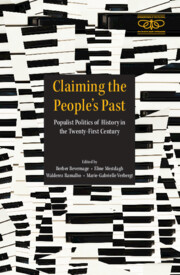Book contents
14 - ‘You Feel Me Bro?’ The Role of Emotions in the Construction of Collective Identities in Populism, Nativism, and Ethnic Nationalism
Published online by Cambridge University Press: 15 May 2024
Summary
Introduction
There was a time in political science and in political philosophy when emotionality and rationality were regarded as opposites and when the presence of emotions as such (especially of ‘passions’) in politics was seen as inappropriate, if not as outright suspect. Since the nineteenth century, many even liked to think that emotionality in politics was a preserve of unruly mobs and crowds. In democratic theory, politics was predominantly conceived as an arena in which various actors were basically pursuing their interests in a deliberate and rational way. Therefore, rational choice theory and coalition formation theory came to be seen as the best instruments to explain democratic politics according to most political scientists.
Since the ‘affective turn’ started in politics and in political thinking in the 1980s – spearheaded by philosophers such as Martha Nussbaum and Chantal Mouffe – this time is no more: emotions are increasingly appealed upon and taken seriously as objects of analysis (Nussbaum 2013; Mouffe 2005). Since then it is no longer possible in politics to criticize political opponents by simply unmasking that their beliefs and actions are based on emotions – and this obviously also holds for right-wing, exclusionary populism because political feelings are as old as modern politics itself (Frevert et al. 2022). Instead, the task of the critics of populism is to analyse the emotional repertoire used by populists in a comparative-historical perspective and to explain why it is successful in terms of mobilizing electoral support (Tietjen 2022; Demertzis 2019).
In this chapter, I address these issues by asking whether the emotions that populism appeals to form a specific set that distinguishes populism from other ideologies or discourses, especially from ethnic nationalism and nativism. However, in order to answer this first question, I first need to clarify the definitions of populism, ethnic nationalism, and nativism that I adopt. I depart from the well-known definition of populism formulated by Cas Mudde and Cristóbal Kaltwasser and indicate the problems connected with this kind of definition in the light of ethnic nationalism. Then I elucidate the concept of ethnic nationalism and its relationship to populism because at least in Western Europe and in the United States of America (USA) they both appear to be very closely related.
- Type
- Chapter
- Information
- Claiming the People's PastPopulist Politics of History in the Twenty-First Century, pp. 267 - 287Publisher: Cambridge University PressPrint publication year: 2024

